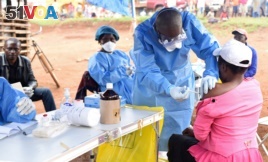20 January, 2019
The Ebola virus is one of the world's deadliest viral diseases. Now, a partnership of public and private organizations in the United States and Canada says it has found a combination of drugs that might treat the deadly disease.
Earlier this month, the World Health Organization reported that at least 580 people in the Democratic Republic of the Congo had contracted the Ebola virus. At least 383 of those people have died from the disease.
The spread of the virus has been difficult to contain although treatments, including a vaccine, have improved. The ongoing conflict in the country's east has interfered with aid efforts.
The Democratic Republic of the Congo, or DRC, is where scientists first discovered the Ebola virus in 1976. At that time, the country was called Zaire. The disease was named after the Ebola River where the virus was infecting people.
From the time of its discovery up to 2013, there was no treatment or vaccine.
Scientists, however, started studying the virus, trying to design better ways to treat its different forms. They succeeded in producing a vaccine. Vaccinations helped to end the Ebola outbreak that spread through three West African countries between 2013 and 2016. More than 11,000 people died in that outbreak.
At that time, treatment for the form of the Ebola virus that came from Zaire was developed. But it was costly to produce and is not effective in treating two other deadly forms of Ebola, the Sudan and Bundibugyo viruses.

FILE - A Congolese health worker administers Ebola vaccine to a woman who had contact with an Ebola sufferer in the Democratic Republic of Congo, Aug. 18, 2018.
A new combination drug for Ebola
Now, scientists have found one treatment for three forms of the virus. Their research produced a combination of drugs called MBP134. They say the treatment helped monkeys infected with the three forms of Ebola recover.
Also, the treatment requires only one injection.
Thomas Geisbert led the research at the University of Texas Medical Branch in Galveston. It was part of a public-private partnership that included the company Mapp Biopharmaceutical, the U.S. Army Research Institute of Infectious Diseases, and the Public Health Agency of Canada.
Geisbert told VOA about the need for a treatment that would work against all forms of Ebola.
"When an outbreak occurs, we really don't know which one of those three strains, species, we call them, is the cause," he said.
He added that earlier treatments available had only worked well against the Zaire species. Geisbert said his group's goal was to develop a treatment that would work for any form of Ebola.
"If I have to make a drug that only works against Zaire, and another drug that only works against Sudan and another drug that only works against the Bundibugyo species, that is extremely expensive," he noted.
Geisbert said the new treatment will save valuable time in identifying which form of Ebola is spreading in an outbreak. He said it will save lives because people can be treated immediately, and it will also save money.
Geisbert noted that there is not a lot of profit for the companies that produce the drugs because there is a very small international market for Ebola treatments.
"So it really has to be sponsored by the government," he said.
In addition to the U.S. Army and the Canadian government, the U.S. National Institutes of Health has supported the research.
Geisbert said the work ahead involves changing the amount of the drugs used to their lowest possible levels. That will make it easier to offer it to the public and to reduce costs. Also testing the drugs on humans must be carried out to ensure the treatment is safe and works well.
The treatment may not be ready to help people with Ebola infections in the current outbreak in the DRC. But countries affected by the virus could have the treatment ready to deal with future Ebola outbreaks if additional tests are successful.
I'm Pete Musto.
Carol Pearson reported this story for VOA. Pete Musto adapted it for Learning English. Mario Ritter Jr. was the editor. How well do you think this new treatment will work in preventing the spread of Ebola? We want to hear from you. Write to us in the Comments Section or on 51VOA.COM.
________________________________________________________________
Words in This Story
contract(ed) – v. to become ill with a disease
outbreak – n. a sudden start or increase of fighting or disease
occur(s) – v. to happen
strain(s) – n. a kind or sort of something
species – n. a group of animals or plants that are similar and can produce young animals or plants
expensive – adj. costing a lot of money
sponsor(ed) – v. to support, take responsibility for or pay for someone or something